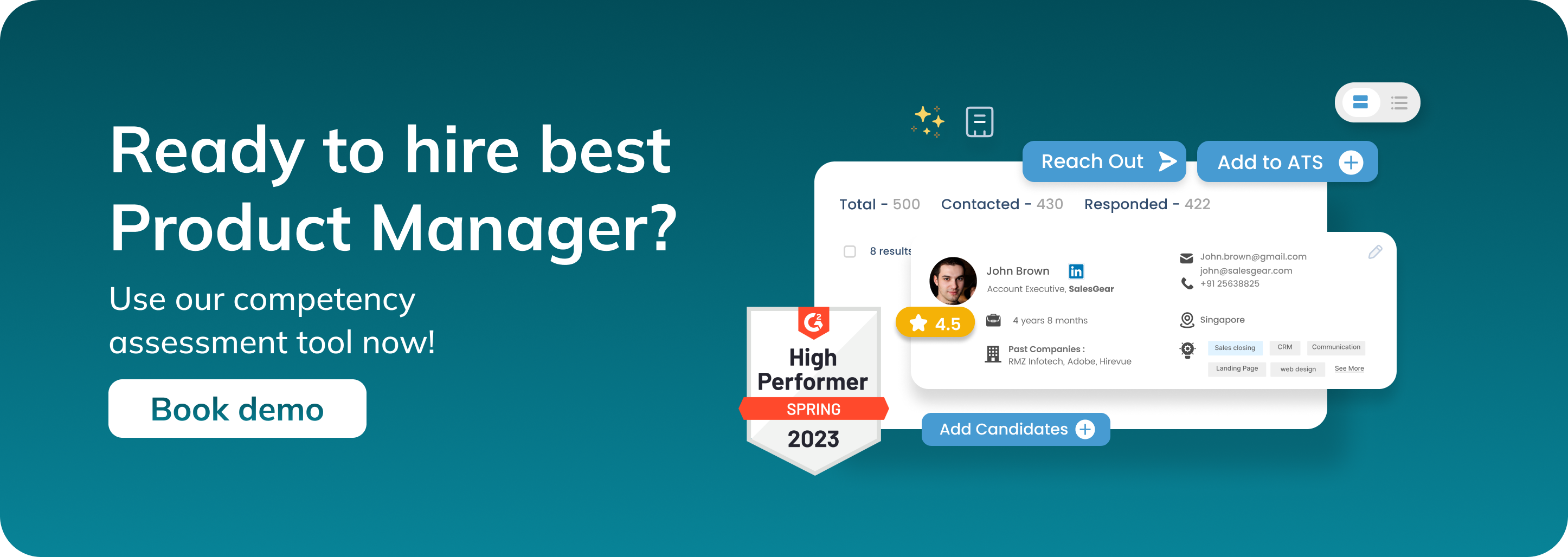Project Management Behavioral Interview Questions and Answers
Published on June 2nd, 2023
Welcome to our comprehensive question bank titled "Project Management Behavioral Interview Questions and Answers." This question bank is specifically designed for recruiters looking to assess candidates' behavioral competencies in project management. These questions focus on evaluating candidates' past experiences, problem-solving skills, communication abilities, leadership qualities and their approach to handling various project management scenarios. Each question is followed by a sample answer that showcases the candidate's behavioral competencies in the respective area. Our goal is to provide you with valuable insights and help you identify the most qualified candidates for project management roles.
Project Management Behavioral Interview Questions and Answers
1. Tell me about a time when you had to handle a challenging stakeholder. How did you approach the situation, and what was the outcome?
Sample Answer: In a previous project, I encountered a stakeholder who had strong reservations about a proposed change to the project scope. I recognized the importance of addressing their concerns and building a positive relationship. I arranged a meeting with the stakeholder to understand their perspective, actively listened to their concerns, and empathized with their point of view. I then presented a detailed analysis of the proposed change, highlighting its potential benefits and addressing the stakeholder's specific concerns. Through open and honest communication, I was able to gain their trust and ultimately secure their support for the change. The outcome was a successful implementation of the change, with the stakeholder becoming an advocate for the project
2. Describe a situation where you had to manage conflicting priorities from different project stakeholders. How did you handle it, and what was the result?
Sample Answer: In a previous project, I faced conflicting priorities from two key stakeholders, each with their own urgent requirements. To resolve the conflict, I scheduled a meeting with both stakeholders to openly discuss their priorities and understand their underlying needs. I facilitated a collaborative discussion to identify common ground and potential compromises. Through active listening and effective negotiation, we reached a mutually acceptable solution that balanced the priorities of both stakeholders. The result was a revised project plan that met the essential needs of both parties while minimizing any negative impact on project objectives.
3 .Can you share an example of a project where you faced unexpected challenges or obstacles? How did you adapt and ensure project success?
Sample Answer: During a project implementation, we faced unexpected technical issues that significantly impacted the project timeline. To adapt and ensure project success, I immediately gathered the project team to assess the situation. We conducted a thorough root cause analysis, involving technical experts and conducting additional testing. Based on our findings, we developed an alternative approach to address the issues and mitigate their impact on the project schedule. This involved reallocating resources, adjusting task dependencies, and increasing communication with stakeholders to manage expectations. Despite the challenges, we successfully delivered the project on time by leveraging our problem-solving skills and proactive approach to mitigate risks.
4. Share an example of a project where you had to manage a tight budget. How did you ensure cost control and deliver the project within budgetary constraints?
Sample Answer: In a previous project, we were tasked with delivering a complex solution with a limited budget. To ensure cost control and deliver within budgetary constraints, I implemented several measures. First, I conducted a comprehensive cost analysis to identify potential areas of cost savings without compromising quality. This included exploring alternative vendors, negotiating favorable contracts, and optimizing resource utilization. I closely monitored project expenses throughout the project lifecycle, tracking costs against the budget and promptly addressing any deviations. By maintaining open communication with the project team and stakeholders, we were able to successfully deliver the project within the allocated budget.
5. Describe a time when you had to lead a diverse and cross-functional project team. How did you foster collaboration and ensure effective teamwork?
Sample Answer: In a cross-functional project, I led a team composed of members from different departments and with diverse skill sets. To foster collaboration and ensure effective teamwork, I established clear project goals and communicated them to the team. I encouraged open and transparent communication, creating a safe environment for team members to share their ideas and concerns. I facilitated regular team meetings and workshops to promote knowledge-sharing and synergy among team members. By recognizing and appreciating each team member's contributions, I fostered a positive team culture that motivated individuals to work together towards a common goal. The result was a high-performing team that successfully delivered the project on time and exceeded expectations.
6. Can you provide an example of a time when you had to make a difficult decision that had a significant impact on the project? How did you approach it, and what was the outcome?
Sample Answer: In a critical project, I faced a situation where an unforeseen risk threatened the project's timeline and quality. After careful analysis and consultation with relevant stakeholders, I made the difficult decision to reallocate additional resources to address the risk and mitigate its impact. I communicated the decision to the project team, explaining the rationale and emphasizing the importance of the project's success. Despite the initial challenges, the outcome was a successful project completion within the expected timeframe and meeting the required quality standards. The decision showcased my ability to make tough choices and prioritize project success while managing stakeholders' expectations.
7. Tell me about a project where you had to deal with scope changes and manage scope creep. How did you handle it, and what were the lessons learned?
Sample Answer: In a previous project, we experienced scope changes and encountered scope creep due to evolving stakeholder requirements. To effectively handle it, I implemented a change management process. I carefully evaluated each change request, considering its impact on the project objectives, timeline, and resources. I engaged in regular communication with stakeholders, emphasizing the need for proper change documentation and assessment. By involving the project team and stakeholders in the change management process, we maintained transparency and ensured that any scope changes were properly reviewed and approved. The lessons learned from this experience were the importance of clear scope definition, stakeholder engagement, and maintaining a robust change control process.
8. Share an example of a time when you faced communication challenges within a project team. How did you overcome them and ensure effective communication?
Sample Answer: In a complex project involving remote team members, we encountered communication challenges that affected collaboration and timely decision-making. To overcome these challenges, I implemented several measures. First, I established a clear communication plan, defining communication channels, frequency, and expectations. I utilized technology tools to facilitate virtual meetings, document sharing, and real-time communication. I encouraged open and active participation during meetings, ensuring that all team members had a voice. By promoting a culture of transparency, respect, and active listening, we were able to overcome the communication challenges and enhance team collaboration, leading to improved project outcomes.
9. Describe a situation where you had to resolve conflicts within a project team. How did you approach the situation, and what was the result?
Sample Answer: In a previous project, conflicts arose between team members with different perspectives and work styles. To resolve the conflicts, I adopted a collaborative approach. I scheduled individual meetings with each team member involved, providing a safe and open space for them to express their concerns and perspectives. I actively listened to each person's viewpoint, seeking common ground and areas of compromise. In a subsequent team meeting, I facilitated a constructive discussion where we acknowledged the differences and focused on finding solutions that aligned with project objectives. The result was improved collaboration, enhanced understanding among team members, and ultimately, a more cohesive and high-performing project team.
10. Can you share an example of a project where you demonstrated your leadership skills and influenced stakeholders to support your proposed approach?
Sample Answer: In a project with tight deadlines and limited resources, I identified the need for a more efficient approach to streamline processes and optimize resource utilization. To gain stakeholder support for the proposed approach, I developed a detailed business case that highlighted the potential benefits, including cost savings and improved project outcomes. I then conducted meetings with key stakeholders, presenting the business case and effectively articulating the advantages of the proposed approach. By addressing their concerns, providing evidence-based reasoning, and demonstrating the alignment of the approach with organizational goals, I successfully influenced stakeholders to support and adopt the proposed changes. The project witnessed improved efficiency, reduced costs, and positive stakeholder feedback, highlighting the success of my leadership approach.
Conclusion
In conclusion, this comprehensive question bank titled "Project Management Behavioral Interview Questions and Answers" is designed to help recruiters assess candidates' behavioral competencies in project management. Through these questions, recruiters can evaluate candidates' past experiences, problem-solving abilities, communication skills, leadership qualities, and their approach to handling various project management scenarios. By analyzing the sample answers provided, recruiters can gain valuable insights into candidates' behavioral competencies and make informed decisions in identifying the most qualified individuals for project management roles.
Thinking of bringing on project managers? Make use of our sourcing tool
Considering hiring project managers for your team? Look no further! Utilize our cutting-edge talent sourcing tool - EasySource to streamline the process and find the perfect fit for your project management needs. Our platform is designed to help you identify top-tier talent efficiently and effectively, saving you time and resources. With our extensive database and advanced search capabilities, you can quickly pinpoint candidates with the right skills, experience, and expertise to drive your projects to success. Say goodbye to the hassle of traditional recruitment methods and welcome a seamless, tailored approach to sourcing project managers with our innovative tool.
Project Management Interview Questions and Answers
Authors

Thomas M. A.
A literature-lover by design and qualification, Thomas loves exploring different aspects of software and writing about the same.
Hire the best without stress
Ask us how
Never Miss The Updates
We cover all recruitment, talent analytics, L&D, DEI, pre-employment, candidate screening, and hiring tools. Join our force & subscribe now!
Stay On Top Of Everything In HR



